#Saint Ambrose Doctor of the Church
Explore tagged Tumblr posts
Text
Celebrating the Feast of Saint Ambrose
On December 7th, we celebrate the Feast of Saint Ambrose, a day dedicated to honoring one of the greatest bishops and theologians in the history of the Catholic Church. Known for his intellect, faith, and charity, Saint Ambrose has left a lasting legacy that continues to inspire Christians around the world. A Brief History: Saint Ambrose, the 4th-century Catholic bishop of Milan, was known for…
#De bono mortis (On the Goodness of Death)#De Fide (On Faith)#De Isaac et anima (On Isaac and the Soul)#De Spiritu Sancto (On the Holy Spirit)#Doctor of the Church#Hexaemeron (On the Six Days of Creation)#Letters: Saint Ambrose#Saint Ambrose#Saint Ambrose Doctor of the Church
0 notes
Text

Happy Feast Day
Saint Ambrose
Doctor of the Church
337-397
Feast day: December 7
Patronage: Beekeeping
Saint Ambrose, an early “Father” and Doctor of the Church, was an educated lawyer and a Roman governor of Milan, with wealth and prestige. In 374 he was elected Bishop by popular demand, even though he was just a catechumen. From that point on he gave his wealth to the poor and for ransom. He learned theology and scripture from St. Simplican. At one point, he even excommunicated the Emperor Theodosius. He fought the Arian heresy and pursued sanctity throughout his life. St. Augustine’s conversion is attributed to St. Ambrose’s reasoning and logic.
Prints, plaques & holy cards available for purchase here. (website)
47 notes
·
View notes
Photo


(via One Minute Reflection – 5 November – “They shall see God.” – Matthew 5:8 – AnaStpaul)
#anastpaul#jesus christ#jesus#doctors of the church#catholic#sedevacantism#st jerome#st augustine#saints#st thomas aquinas#st bernard#st anselm#st anthony of padua#st alphonsus liogouri#st ambrose#st albert the great#catholicism#roman catholic#christianity
11 notes
·
View notes
Text
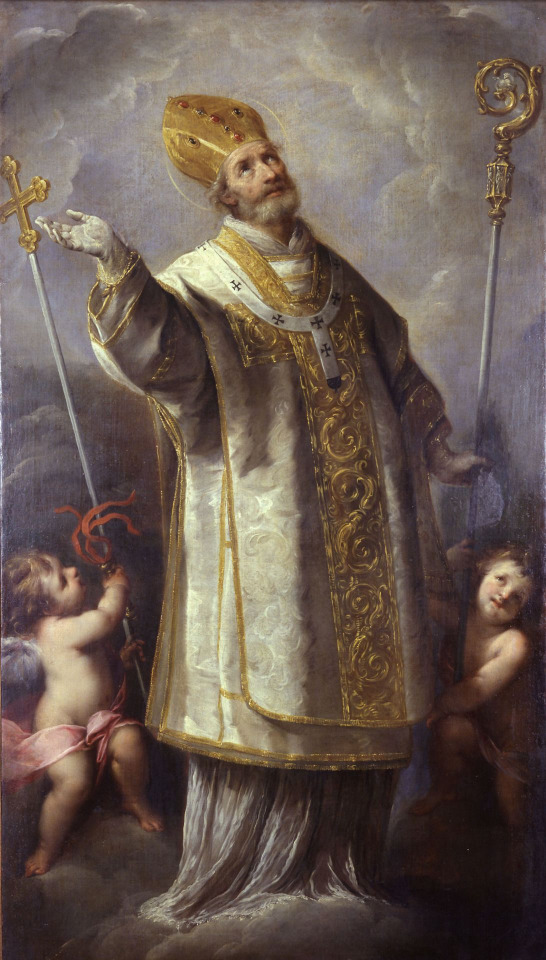
THE DESCRIPTION OF SAINT AMBROSE OF MILAN Feast Day: December 7
"It is preferable to have a virgin mind than a virgin body. Each is good if each be possible; if it be not possible, let me be chaste, not to man but to God."
Like Augustine himself, the older Ambrose, born around 340, was a highly educated man who sought to harmonize Greek and Roman intellectual culture with the Catholic faith. Trained in literature, law, and rhetoric, he eventually became the governor of Liguria and Emilia, with headquarters at Milan. He manifested his intellectual gifts in defense of Christian doctrine even before his baptism.
While Ambrose was serving as governor, a bishop named Auxentius was leading the diocese. Although he was an excellent public speaker with a forceful personality, Auxentius also followed the heresy of Arius, which denied the divinity of Christ. Although the Council of Nicaea had reasserted the traditional teaching on Jesus' deity, many educated members of the Church – including, at one time, a majority of the world's bishops – looked to Arianism as a more sophisticated and cosmopolitan version of Christianity. Bishop Auxentius became notorious for forcing clergy throughout the region to accept Arian creeds.
At the time of Auxentius' death, Ambrose had not yet even been baptized. But his deep understanding and love of the traditional faith were already clear to the faithful of Milan. They considered him the most logical choice to succeed Auxentius, even though he was still just a catechumen. With the help of Emperor Valentinan II, who ruled the Western Roman Empire at the time, a mob of Milanese Catholics virtually forced Ambrose to become their bishop against his own will. Eight days after his baptism, Ambrose received episcopal consecration on Dec. 7, 374. The date would eventually become his liturgical feast.
Bishop Ambrose did not disappoint those who had clamored for his appointment and consecration. He began his ministry by giving everything he owned to the poor and to the Church. He looked to the writings of Greek theologians like St. Basil for help in explaining the Church's traditional teachings to the people during times of doctrinal confusion. Like the fathers of the Eastern Church, Ambrose drew from the intellectual reserves of pre-Christian philosophy and literature to make the faith more comprehensible to his hearers. This harmony of faith with other sources of knowledge served to attract, among others, the young professor Aurelius Augustinus – a man Ambrose taught and baptized, whom history knows as St. Augustine of Hippo.
Ambrose himself lived simply, wrote prolifically, and celebrated Mass each day. He found time to counsel an amazing range of public officials, pagan inquirers, confused Catholics and penitent sinners. His popularity, in fact, served to keep at bay those who would have preferred to force him from the diocese, including the Western Empress Justina and a group of her advisers, who sought to rid the West of adherence to the Nicene Creed, pushing instead for strict Arianism. Ambrose heroically refused her attempts to impose heretical bishops in Italy, along with her efforts to seize churches in the name of Arianism. Ambrose also displayed remarkable courage when he publicly denied communion to the Emperor Theodosius, who had ordered the massacre of 7,000 citizens in Thessalonica leading to his excommunication by Ambrose. The chastened emperor took Ambrose's rebuke to heart, publicly repenting of the massacre and doing penance for the murders. "Nor was there afterwards a day on which he did not grieve for his mistake," Ambrose himself noted when he spoke at the emperor's funeral.
The rebuke spurred a profound change in Emperor Theodosius. He reconciled himself with the Church and the bishop, who attended to the emperor on his deathbed. St. Ambrose died in 397. His 23 years of diligent service had turned a deeply troubled diocese into an exemplary outpost for the faith. His writings remained an important point of reference for the Church, well into the medieval era and beyond. St. Ambrose has been named one of the 'holy fathers' of the Church, whose teaching all bishops should 'in every way follow.'
Ambrose joins Augustine, Jerome, and Gregory the Great as one of the Latin Doctors of the Church.
#random stuff#catholic#catholic saints#ambrose of milan#san ambrocio#saint ambrose#beekeepers#candlemakers#doctor of the church
4 notes
·
View notes
Text
SAINT OF THE DAY (December 7)

Today, the Catholic Church celebrates the memory of St. Ambrose, the brilliant Bishop of Milan who influenced St. Augustine's conversion and was named a Doctor of the Church.
Like Augustine himself, the older Ambrose, born around 340, was a highly educated man who sought to harmonize Greek and Roman intellectual culture with the Catholic faith.
Trained in literature, law and rhetoric, he eventually became the governor of Liguria and Emilia, with headquarters at Milan.
He manifested his intellectual gifts in defense of Christian doctrine even before his baptism.
While Ambrose was serving as governor, a bishop named Auxentius was leading the diocese.
Although he was an excellent public speaker with a forceful personality, Auxentius also followed the heresy of Arius, which denied the divinity of Christ.
Although the Council of Nicaea had reasserted the traditional teaching on Jesus' deity, many educated members of the Church – including, at one time, a majority of the world's bishops – looked to Arianism as a more sophisticated and cosmopolitan version of Christianity.
Bishop Auxentius became notorious for forcing clergy throughout the region to accept Arian creeds.
At the time of Auxentius' death, Ambrose had not yet even been baptized.
But his deep understanding and love of the traditional faith were already clear to the faithful of Milan.
They considered him the most logical choice to succeed Auxentius, even though he was still just a catechumen.
With the help of Emperor Valentinan II, who ruled the Western Roman Empire at the time, a mob of Milanese Catholics virtually forced Ambrose to become their bishop against his own will.
Eight days after his baptism, Ambrose received episcopal consecration on 7 December 374. The date would eventually become his liturgical feast.
Bishop Ambrose did not disappoint those who had clamored for his appointment and consecration.
He began his ministry by giving everything he owned to the poor and to the Church.
He looked to the writings of Greek theologians like St. Basil for help in explaining the Church's traditional teachings to the people during times of doctrinal confusion.
Like the fathers of the Eastern Church, Ambrose drew from the intellectual reserves of pre-Christian philosophy and literature to make the faith more comprehensible to his hearers.
This harmony of faith with other sources of knowledge served to attract, among others, the young professor Aurelius Augustinus – a man Ambrose taught and baptized, whom history knows as St. Augustine of Hippo.
Ambrose himself lived simply, wrote prolifically, and celebrated Mass each day.
He found time to counsel an amazing range of public officials, pagan inquirers, confused Catholics, and penitent sinners.
His popularity, in fact, served to keep at bay those who would have preferred to force him from the diocese, including the Western Empress Justina and a group of her advisers, who sought to rid the West of adherence to the Nicene Creed, pushing instead for strict Arianism.
Ambrose heroically refused her attempts to impose heretical bishops in Italy, along with her efforts to seize churches in the name of Arianism.
Ambrose also displayed remarkable courage when he publicly denied communion to the Emperor Theodosius, who had ordered the massacre of 7,000 citizens in Thessalonica leading to his excommunication by Ambrose.
The chastened emperor took Ambrose's rebuke to heart, publicly repenting of the massacre and doing penance for the murders.
“Nor was there afterwards a day on which he did not grieve for his mistake,” Ambrose himself noted when he spoke at the emperor's funeral.
The rebuke spurred a profound change in Emperor Theodosius. He reconciled himself with the Church and the bishop, who attended to the emperor on his deathbed.
St. Ambrose died in 397.
His 23 years of diligent service had turned a deeply troubled diocese into an exemplary outpost for the faith.
His writings remained an important point of reference for the Church, well into the medieval era and beyond.
St. Ambrose has been named one of the “Holy Fathers of the Church, whose teaching all bishops should in every way follow.”
7 notes
·
View notes
Text
𝐃𝐞𝐜𝐞𝐦𝐛𝐞𝐫 𝟕, 𝟐𝟎𝟐𝟑 𝐆𝐨𝐬𝐩𝐞𝐥
Memorial of Saint Ambrose, Bishop and Doctor of the Church
Mt 7:21, 24-27
Jesus said to his disciples:
"Not everyone who says to me, 'Lord, Lord,'
will enter the Kingdom of heaven,
but only the one who does the will of my Father in heaven.
"Everyone who listens to these words of mine and acts on them
will be like a wise man who built his house on rock.
The rain fell, the floods came,
and the winds blew and buffeted the house.
But it did not collapse; it had been set solidly on rock.
And everyone who listens to these words of mine
but does not act on them
will be like a fool who built his house on sand.
The rain fell, the floods came,
and the winds blew and buffeted the house.
And it collapsed and was completely ruined."

#jesus#catholic#my remnant army#jesus christ#virgin mary#faithoverfear#saints#jesusisgod#endtimes#artwork#Jesus is coming#Gospel#word for God#Bible#biblevisuals#bible verse#bibleverse#come holy spirit
17 notes
·
View notes
Text
Holidays 6.24
Holidays
Accla Brewing Day (Ancient Inca)
Araw ng Maynila (a.k.a. Manilla Day; Philippines)
Bannockburn Day (Scotland)
Burning of the Lamps (Sais, Egypt; Ancient Egypt)
Calcio Fiorentino (Florence, Italy)
Carabobo Day (Venezuela)
Cat World Domination Day
Celebration of the Senses Day
Countryman’s Day (Peru)
Day of the Caboclo (Amazonas State, Brazil)
Dia del Indio (a.k.a. Day of the Indian; Latin America)
Discovery Day (Newfoundland and Labrador; Canada)
Dobbs Anniversary Day
Experiment 624 Day (a.k.a. Angel Day; Lilo & Stitch)
Farmer Day (Peru)
Festival of Contagious Magic
Fisherman's Day (Zaire)
Flying Saucer Day
Free RPG Day
French Canadian-American Day
Global Day of Action to Climate & Employment Proof Our Work
Hawaiian Coffee Day
International Day of the Makeup Artist
International Day of Women in Diplomacy
International Fairy Day (a.k.a. Faerie Day)
International Ia Day (Romania)
La Festa Dei Gigli (Festival of the Lilies; Italy)
Lost Handkerchief Day
Manila Day (Philippines)
Melpomene Asteroid Day
Museum Comes To Life Day
National Ageless Day
National Day of Joy
National Holiday of Quebec (Canada)
National Kenneth Day
National Indigenous Day (Peru)
National Le Day
National Midwife Day (Indonesia)
National Parchment Day
National Patch Day
National Pegging Day
National Relationship Equity Day
National Upcycling Day
Quarter Day (England, Ireland & Wales) [2 of 4]
Rosemary Day (French Republic)
Sânziene (Carpathian Mountains, Romania)
St. John’s Wort Day
Stonewall National Monument Day
Summer List Day
Summersgiving
Surfside Remembrance Day (Florida)
Swim a Lap Day
Swing a Kid Day
Think Your Way to Health Day
Tibedetha (a.k.a. Tiber’s Day; Elder Scrolls)
Universal Day of the Romanian Blouse
World Alsace Lovers’ Day
World History Day
World Messi Day
World Senses Day
World UFO Day [& 7.2]
World Young Doctors Day
Food & Drink Celebrations
American Barley Wine Day
National Creamy Pralines Day (a.k.a. National Pralines Day)
National Take Back the Lunch Break Day
Independence & Related Days
City Day (Porto, Portugal)
Constitution Day (Zaire)
Edanzia (Declared; 2018) [unrecognized]
Gishabrun (Declared; 2009) [unrecognized]
4th & Last Monday in June
Hetero Male Monday (Boise, Idaho) [Every Monday in June]
Motivation Monday [Every Monday]
Please Take My Children To Work Day [Last Monday]
Weekly Holidays beginning June 24 (4th Full Week)
Boys & Girls Club Week (thru 6.28) [Mon-Fri of Last Week]
Lost Handkerchief Week (Shamanism)
Festivals Beginning June 24, 2024
APGA Conference (Boston, Massachusetts) [thru 6.27]
HTEC 2024 (Charlotte, North Carolina) [thru 6.27]
INmusic Festival (Zagreb, Croatia) [thru 6.26]
National Insect Week (thru 6.30)
Feast Days
Alfred (Positivist; Saint)
Amitabha Buddha Day (Buddhism)
Ambrose Bierce (Writerism)
Anton LaVey Day (Church of the SubGenius; Saint)
Bartholomew of Dunelm (or Farne; Christian; Saint)
The Burning of the Lamps (Ancient Egypt; Everyday Wicca)
Claribelle (Muppetism)
Eleanor Norcross (Artology)
Feast of Parvati )Woien’s Festival; India)
Feast of Rahmat (Baha’i)
Ferdinand Bol (Artology)
Festival of Fata (Ancient Roman Goddess of Fate and Chance)
Fors Fortuna (Ancient Rome)
Fortuna’s Day (Pagan)
International Fairy Day (Starza Pagan Book of Days)
Inti Raymi (Ancient Inca)
Jan Matejko (Artology)
Jean Metzinger (Artology)
Lawrence Block (Writerism)
Margaret Olley (Artology)
María Guadalupe García Zavala (Christian; Saint)
The Martyrs under Nero (Christian; Martyrs)
Midsummer
Mog Ruith (Servant of the Wheel; Celtic Book of Days)
Nativity of Saint John the Baptist (Christian; Saint)
Robert Henri (Artology)
St. John’s Day [and 2nd Day of Midsummer celebrations] (a.k.a. ...
Bonfires of St. John (Spain)
Enyovden (Bulgaria)
Feast of the Dews (Lithuania)
Inti Raymi (Festival of the Sun, a.k.a. Peasants Day, Peru)
Jaanipäev (Estonia)
Jāņi (Latvia)
Joninės (a.k.a. Saint Jonas' Festival; Lithuania)
Jónsmessa (Iceland)
Macau Day (China)
Midsommardagen (Sweden)
Midsummer Day (England)
Midsummer’s Day (Estonia)
Quarter Day (England)
Saint John the Baptist Day (Andorra)
Saint Jonas' Festival or Joninės (Lithuania)
Sant-Jean-Baptiste Day (Quebec)
Sânziene (western Carpathian Mountains of Romania)
Surinal (North Korea)
Wattah Wattah Festival (Philippines)
Zuni Buffalo, Corn and Comanche Dances (Zuni Native Americans)
Saloua Raouda Choucair (Artology)
Sexual Fantasy Day (Pastafarian)
Simplicius (Christian; Saint)
Sun Festival (Peru)
Zamling Chisang (Universal Prayer Day; Tibetan Deities, esp. Samy Dolde)
Zemlya's Night (Mati-Syra-Zemlya, Slavic Goddess of the Earth)
Orthodox Christian Liturgical Calendar Holidays
Whit Monday [50 days after Orthodox Easter] (Orthodox Christian) a.k.a. ...
Doua Zi de Rusalii (România)
Holy Spirit Monday
Kataklysmos (Cyprus)
Monday of the Holy Spirit
Pentecost Monday
Lucky & Unlucky Days
Taian (大安 Japan) [Lucky all day.]
Unfortunate Day (Pagan) [37 of 57]
Premieres
All a Bir-r-r-d (WB LT Cartoon; 1950)
Ape Suzette (The Inspector Cartoon; 1966)
Bewitched (Film; 2005)
The Caine Mutiny (Film; 1954)
Cars 2 (Animated Pixar Film; 2011)
Cat Ballou (Film; 1965)
Catch-22 (Film; 1970)
Chastity (Film; 1969)
A Chinaman’s Chance (Ub Iwerks Cartoon; 1933)
Dangerously in Love, by Beyoncé (Album; 2003)
Elvis (Film; 2022)
4, by Beyoncé (Album; 2011)
Generation Cancellation, by Little Big (Song; 2022)
The Great Milenko, by Insane Clown Posse (Album; 1997)
Happy-Go-Nutty, featuring Screwy Squirrel (Tex Avery MGM Cartoon; 1944)
Hawaiian Vacation (Pixar Toy Story Cartoon; 2011)
Herbie Goes to Monte Carlo (Film; 1977)
Hot Air Races (Fleischer/Famous Popeye Cartoon; 1949)
Independence Day: Resurgence (Film; 2016)
The Last Indian (Terrytoons Cartoon; 1938)
The Lion King (Animated Disney Film that ripped off Kimba; 1994)
Little Girl Blue, by Nina Simone (Album; 1958)
The Man from Toronto (Film; 2022)
March of the Penguins (Documentary Film; 2005)
McCabe & Mrs. Miller (Film; 1971)
Mr. Robot (TV Series; 2015)
The Newsroom (TV Series; 2012)
Nuts and Jolts (Oswald the Lucky Rabbit Cartoon; 1929)
Pink Paradise (Pink Panther Cartoon; 1967)
Scalp Trouble (WB LT Cartoon; 1939)
A Scent of the Matterhorn (WB LT Cartoon; 1961)
A Sleepless Night (Heckle & Jeckle Cartoon; 1948)
Sorcerer (Film; 1977)
Spaceballs (Film; 1987)
A Spaniard in the Works, by John Lennon (Book; 1965)
The Spy Swatter (WB LT Cartoon; 1967)
Star Maker, by Olaf Stapledon (Novel; 1937)
Swiss Army Man (Film; 2016)
Symphony No. 5 in D Major, by Ralph Vaughan Williams (Symphony; 1943)
Ten North Frederick, by John O'Hara (Novel; 1955)
Tinker, Tailor, Soldier, Spy, by John le Carré (Novel; 1974)
Under the Dome (TV Series; 2013)
Undone - The Sweater Song, by Weezer (Song; 1994)
Who Framed Roger Rabbit (Film; 1988)
Who’s Cookie’ Who? (Woody Woodpecker Cartoon; 1946)
The Will to Meaning, by Viktor E. Frankl (Psychology Book; 1969)
Yellowbeard (Film; 1983)
Today’s Name Days
Johannes, Reingard (Austria)
Enio, Yanita, Yanka, Yanko (Bulgaria)
Faust, Ivan, Krsto (Croatia)
Jan (Czech Republic)
Hans (Denmark)
Annes, Ants, Hannes, Hans, Jaan, Jan, Janno, Johan, Johannes, Juhan, Juho, Jukk, Juss, Kanek (Estonia)
Jani, Janne, Johannes, Juha, Juhana, Juhani, Juho, Jukka, Jussi (Finland)
Jean-Baptiste (France)
Johannes, Reingard (Germany)
Giota, Giotis, Panagioula, Panagoula, Panayotis, Panagiotis, Panos, Panousos, Panagis, Panagos, Panagiota, Panayota, Pani, Panikos, Pegie, Pegy, Takis, Tota, Toula, Yiota, Yiotis (Greece)
Iván (Hungary)
Gabriele, Giovanni, Romolo (Italy)
Jānis, Žanis (Latvia)
Eiviltas, Eiviltė, Jonas (Lithuania)
Hans, Johannes, Jon (Norway)
Dan, Danisz, Danuta, Emilia, Jan, Wilhelm (Poland)
Ioan (România)
Ján (Slovakia)
Bautista, Iván, Juan (Spain)
Johannes (Sweden)
Bohuslav, Bohuslava, Boris, Boryslav, Boryslava, Ivan, Jean, Joan, Johanna, John, Slavka, Slavko, Yvonna (Ukraine)
Hans, Giovanna, Giovanni, Ian, Ivan, Jan, Jana, Jean, Jeanette, Jeannette, Johan, John, Johnnie, Johnny, Juan, Juana, Juanita, Sean, Shana, Shane, Shanna, Yancy (USA)
Today is Also…
Day of Year: Day 176 of 2024; 190 days remaining in the year
ISO: Day 1 of week 26 of 2024
Celtic Tree Calendar: Duir (Oak) [Day 16 of 28]
Chinese: Month 5 (Geng-Wu), Day 19 (Ji-Wei)
Chinese Year of the: Dragon 4722 (until January 29, 2025) [Wu-Chen]
Hebrew: 18 Sivan 5784
Islamic: 17 Dhu al-Hijjah 1445
J Cal: 26 Blue; Fryday [26 of 30]
Julian: 11 June 2024
Moon: 91%: Waning Gibbous
Positivist: 7 Charlemagne (7th Month) [Alfred]
Runic Half Month: Feoh (Wealth) [Day 1 of 15]
Season: Summer (Day 5 of 94)
Week: 4th Full Week of June)
Zodiac: Cancer (Day 4 of 31)
Calendar Changes
Feoh (Wealth) [Half-Month 13 of 24; Runic Half-Months] (thru 7.8)
3 notes
·
View notes
Text


From Taylor’s Simstagram account (@.taylorgrace):
Off to our church’s fall festival with my kiddos, plus Zelie’s sweet friend Emily! We have a hot dog, a scarecrow, a bumblebee, a ladybug, a horse, and a mama with a hat she dug out from her college days!!! I’m sure I’m not the only one cringing at the thought of how I used to celebrate Halloween!!!
Justin also thought it would be fun for our kiddos to dress up as saints for All Saints Day, so I’m working on those costumes too! Gia will be St. Teresa of Avila, the first female Doctor of the Church, and Max will be St. George, the warrior saint. Ambrose decided to go as St. Francis—he really really wants a pet, but we just don’t have the bandwidth to care for one! And Zelie couldn’t decide which saint she wanted to be, so we decided she will dress up as our Blessed Virgin Mother!
(A/N: “Handmade costumes of saints” is not really a thing that exists in Sims CC land, so you will have to imagine what these poor kids will look like.)
10 notes
·
View notes
Text
Saints&Reading: Sunday, April 14, 2024
april 1_april 14
VENERABLE BARSANUPHIUS OF OPTINA (1913)

Paul I. Plikhanov was born in the city of Samara on July 5,1845, the son of John and Natalia Plikhanov. His mother died in childbirth, and his father later remarried so that his son would have a mother. Although his stepmother was very strict, she was a real mother to him, and he loved her very much.
As a descendant of the Orenburg Cossacks, Paul was enrolled in the Polotsk Cadet Corps. He completed his studies at the Orenburg Military School and received an officer’s commission. He later graduated from the Petersburg Cossack Staff Officers’ School, and also served at the headquarters of the Kazan military district and eventually rose to the rank of colonel.
Once, as he was sick with pneumonia, Paul sensed that he was about to die. He asked his orderly to read the Gospel to him, and passed out. Then he had a vision in which the heavens seemed to open, and he was afraid because of the great light. His whole sinful life passed before him, and he was overcome with repentance. A voice told him he should go to Optina Monastery, but the doctors did not think he would recover. His health did improve, however, and the colonel visited Optina. In August 1889 the Elder of the Monastery was Saint Ambrose (October 10), who told Paul to set his worldly affairs in order. Two years later, Saint Ambrose blessed him to cut all ties to the world and told him to enter Optina within three months.
It was not easy for the colonel to resign his commission within the specified three month period, because obstacles were placed in his way. In fact, he was offered a promotion to the rank of general, and was asked to delay his retirement. Some people even tried to arrange a marriage for him, laughing at his intention to go to the monastery. Only his stepmother was happy that he wished to become a monk. On the very last day of the three months he concluded his affairs and arrived at Optina. However, Saint Ambrose was already laid out in his coffin in the church.
Saint Anatole I (January 25) succeeded Father Ambrose as Elder, and he assigned Paul to Hieromonk Nectarius (April 29) as his cell attendant. He was accepted as a novice in 1892, and tonsured as a rassophore in 1893. Over the next ten years he advanced through the various stages of monastic life, including ordination as deacon (1902), and as priest (1903). The monk Paul was secretly tonsured into the mantiya in December of 1900 because of a serious illness. When they asked him what name he wished to receive, he said it did not matter. They named him in honor of Saint Barsanuphius of Tver and Kazan (April 11). Although he recovered, they did not give him the mantiya until December of 1902 after the Liturgy when it was revealed that he had been tonsured on his sickbed.
On September 1, 1903 Father Barsanuphius was appointed to assist Elder Joseph, the skete Superior, in the spiritual direction of the skete brethren and the sisters of the Shamordino convent.
At the beginning of the Russo-Japanese war in 1904, Father Barsanuphius was sent to the Far East as a military chaplain, where he ministered to wounded soldiers. The war ended in August 1905, and Saint Barsanuphius returned to Optina on November 1, 1905.
Since Elder Joseph had become too old and frail to administer the skete’s affairs, Father Barsanuphius was appointed as Superior of the skete in his place. Father Barsanuphius soon reestablished order and discipline, paid off debts, repaired buildings, etc. As Superior, he combined strictness with paternal concern and tenderness for those under him.
Saint Barsanuphius, like the other Elders of Optina, possessed the gifts of clairvoyance and of healing people afflicted with physical and spiritual ailments. One of his spiritual sons, Father Innocent Pavlov, recalled his first Confession with the Elder. He became fearful because Father Barsanuphius seemed to know his innermost thoughts, reminding him of people and events which he had forgotten. The saint spoke gently and told him that it was God who had revealed to him these things about Father Innocent. “During my lifetime, do not tell anyone about what you are experiencing now,” he said, “but you may speak of it after my death.”
Saint Barsanuphius loved spiritual books, especially the Lives of the Saints. He often told people that those who read these Lives with faith benefit greatly from doing so. The answers to many of life’s questions can be found by reading the Lives of the Saints, he said. They teach us how to overcome obstacles and difficulties, how to stand firm in our faith, and how to struggle against evil and emerge victorious. Although the Lives of the Saints were widely available, it saddened the Elder that more people did not read them.
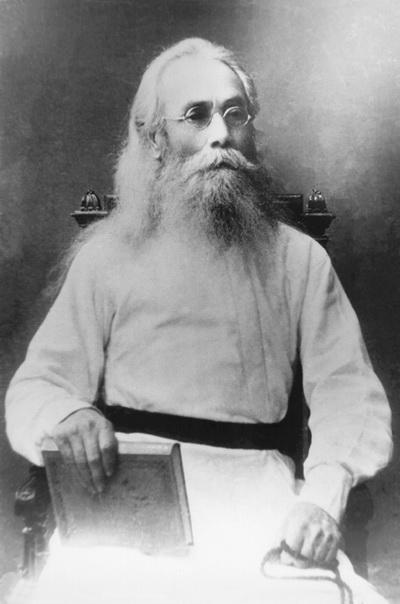
Saint Barsanuphius commemorated many saints each day during his Rule of prayer, and this was not accidental. Each saint, he once explained, had some particular importance in his life. If, for example, some significant event took place, he would look to see which saints were commemorated on that day, then he would begin to commemorate them each day. Later he noticed that on their Feast Day, they would often deliver him from some danger or trouble. On December 17, 1891, the commemoration of the Prophet Daniel and the three holy youths, he left Kazan and never returned. That was the day he decided to leave the world, and Saint Barsanuphius felt that God had delivered him from a furnace of passions. Just as the three youths were delivered from the fiery furnace because they would not bow down before idols, the Elder always believed that he left the world unharmed because he refused to bow down before the idols of lust, pride, gluttony, etc.
By 1908, Saint Barsanuphius seemed to fall ill more frequently, and began to speak of his approaching death. In April of that year, someone sent him a package containing the Great Schema. Father Barsanuphius had long desired to be tonsured into the Great Schema before his death, but he had told no one of this except for the archimandrite. Therefore, he regarded this as a sign that he would soon die.
One night in July 1910, the Elder became so ill that he had to leave church during Vigil and return to his cell. The next morning, July 11, he was so weak that he could not sit up by himself. That evening he was tonsured into the Great Schema.
Father Barsanuphius began to recover, but there were new problems in the monastery. New monks came in from spiritually lax environments. They did not understand the ascetical nature of monasticism or the whole notion of eldership, and so they began to clamor for reform and change. They wanted to assume positions of authority, and to close the skete. Because of their complaints, Father Barsanuphius was removed from Optina and assigned as igumen of the Golutvinsky Monastery. When he arrived to take up his duties, Father Barsanuphius found the monastery in a state of physical and spiritual decline. Nevertheless, he did not lose heart, and soon the monastery began to revive. More people began to visit, once they heard that an Optina Elder had come to Goluvinsky, and the monastery’s financial position also began to improve. However, the rebellious brethren caused him great sorrow, and he had to expel some of them
At the beginning of 1913, Saint Barsanuphius became ill again and asked Metropolitan Macarius of Moscow for permission to retire to Optina, but that was not to be. He fell asleep in the Lord on April 1, and his body remained in the church of Golotvino until April 6 (which was also Lazarus Saturday). After the funeral, his body was placed on a train and sent to Optina for burial. The train arrived at Kozelsk Station on April 8, and the coffin was carried to Optina by clergy.
The Moscow Patriarchate authorized local veneration of the Optina Elders on June 13, 1996. The work of uncovering the relics of Saints Leonid, Macarius, Hilarion, Ambrose, Anatole I, Barsanuphius and Anatole II began on June 24/July 7, 1998 and was concluded the next day. However, because of the church Feasts (Nativity of Saint John the Baptist, etc.) associated with the actual dates of the uncovering of the relics, Patriarch Alexey II designated June 27/July 10 as the date for commemorating this event. The relics of the holy Elders now rest in the new church of the Vladimir Icon of the Mother of God.
The Optina Elders were glorified by the Moscow Patriarchate for universal veneration on August 7, 2000.
VENERABLE GERONTIUS, YOUTH, CANONARCH OF THE KIEV CAVE (14th.c.)
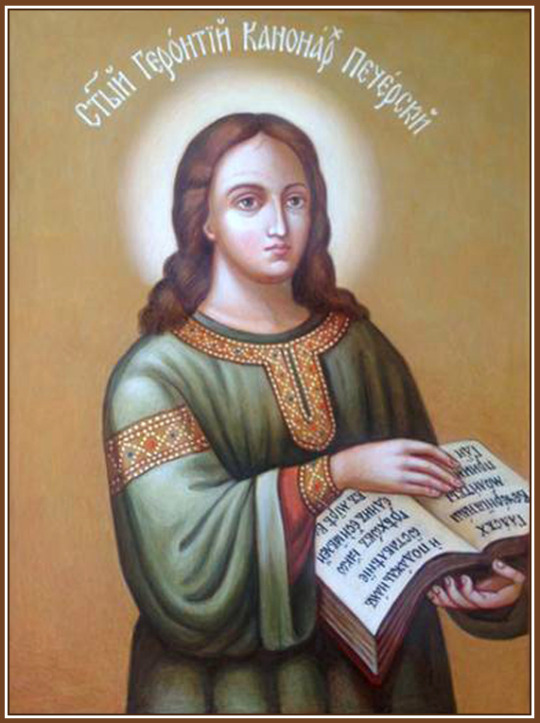
Saint Gerontius lived during the fourteenth century. He was a monk of the Kiev Caves Monastery and fulfilled the obedience of canonarch (leader of church singing). He spent all his life at the monastery, in ascetic deeds of abstinence, obedience, and prayer.
Saint Gerontius was buried in the Far Caves. His memory is celebrated also together with the Synaxis of the Saints of the Far Caves, on August 28.

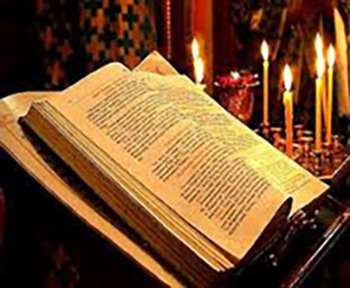
EPHESIANS 5:9-19
9 (for the fruit of the Spirit is in all goodness, righteousness, and truth), 10 finding out what is acceptable to the Lord. 11 And have no fellowship with the unfruitful works of darkness, but rather expose them. 12 For it is shameful even to speak of those things which are done by them in secret. 13 But all things that are exposed are made manifest by the light, for whatever makes manifest is light. 14 Therefore He says: "Awake, you who sleep, Arise from the dead, And Christ will give you light." 15 See then that you walk circumspectly, not as fools but as wise, 16 redeeming the time, because the days are evil. 17 Therefore do not be unwise, but understand what the will of the Lord is. 18 And do not be drunk with wine, in which is dissipation; but be filled with the Spirit, 19 speaking to one another in psalms and hymns and spiritual songs, singing and making melody in your heart to the Lord,
MARK 9:17-31
17 Then one of the crowd answered and said, "Teacher, I brought You my son, who has a mute spirit. 18 And wherever it seizes him, it throws him down; he foams at the mouth, gnashes his teeth, and becomes rigid. So I spoke to Your disciples, that they should cast it out, but they could not. 19 He answered him and said, "O faithless generation, how long shall I be with you? How long shall I bear with you? Bring him to Me." 20 Then they brought him to Him. And when he saw Him, immediately the spirit convulsed him, and he fell on the ground and wallowed, foaming at the mouth. 21 So He asked his father, "How long has this been happening to him?" And he said, "From childhood. 22 And often he has thrown him both into the fire and into the water to destroy him. But if You can do anything, have compassion on us and help us. 23 Jesus said to him, "If you can believe, all things are possible to him who believes." 24 Immediately the father of the child cried out and said with tears, "Lord, I believe; help my unbelief!" 25 When Jesus saw that the people came running together, He rebuked the unclean spirit, saying to it: "Deaf and dumb spirit, I command you, come out of him and enter him no more!" 26 Then the spirit cried out, convulsed him greatly, and came out of him. And he became as one dead, so that many said, "He is dead." 27 But Jesus took him by the hand and lifted him up, and he arose. 28 And when He had come into the house, His disciples asked Him privately, "Why could we not cast it out?" 29 So He said to them, "This kind can come out by nothing but prayer and fasting." 30 Then they departed from there and passed through Galilee, and He did not want anyone to know it. 31 For He taught His disciples and said to them, "The Son of Man is being betrayed into the hands of men, and they will kill Him. And after He is killed, He will rise the third day."
#orthodoxy#orthodoxchristianity#easternorthodoxchurch#originofchristianity#holyscriptures#gospel#wisdom#spirituality#saints
5 notes
·
View notes
Text

7th December >> Mass Readings (Except USA)
Saint Ambrose, Bishop, Doctor
on
Thursday, First Week of Advent.
Thursday, First Week of Advent
(Liturgical Colour: White: B (2))
(Readings for the feria (Thursday))
(There is a choice today between the readings for the ferial day (Thursday) and those for the memorial. The ferial readings are recommended unless pastoral reasons suggest otherwise)
First Reading Isaiah 26:1-6 Open the gates; let the upright nation come in.
That day, this song will be sung in the land of Judah: We have a strong city; to guard us he has set wall and rampart about us. Open the gates! Let the upright nation come in, she, the faithful one whose mind is steadfast, who keeps the peace, because she trusts in you. Trust in the Lord for ever, for the Lord is the everlasting Rock; he has brought low those who lived high up in the steep citadel; he brings it down, brings it down to the ground, flings it down in the dust: the feet of the lowly, the footsteps of the poor trample on it.
The Word of the Lord
R/ Thanks be to God.
Responsorial Psalm Psalm 117(118):1,8-9,19-21,25-27
R/ Blessed in the name of the Lord is he who comes. or R/ Alleluia.
Give thanks to the Lord for he is good, for his love has no end. It is better to take refuge in the Lord than to trust in men; it is better to take refuge in the Lord than to trust in princes.
R/ Blessed in the name of the Lord is he who comes. or R/ Alleluia.
Open to me the gates of holiness: I will enter and give thanks. This is the Lord’s own gate where the just may enter. I will thank you for you have answered and you are my saviour.
R/ Blessed in the name of the Lord is he who comes. or R/ Alleluia.
O Lord, grant us salvation; O Lord, grant success. Blessed in the name of the Lord is he who comes. We bless you from the house of the Lord; the Lord God is our light.
R/ Blessed in the name of the Lord is he who comes. or R/ Alleluia.
Gospel Acclamation Isaiah 40:9-10
Alleluia, alleluia! Shout with a loud voice, joyful messenger to Jerusalem. Here is the Lord God coming with power. Alleluia!
Or: Isaiah 55:6
Alleluia, alleluia! Seek the Lord while he is still to be found, call to him while he is still near. Alleluia!
Gospel Matthew 7:21,24-27 The wise man built his house on a rock.
Jesus said to his disciples: ‘It is not those who say to me, “Lord, Lord,” who will enter the kingdom of heaven, but the person who does the will of my Father in heaven. Therefore, everyone who listens to these words of mine and acts on them will be like a sensible man who built his house on rock. Rain came down, floods rose, gales blew and hurled themselves against that house, and it did not fall: it was founded on rock. But everyone who listens to these words of mine and does not act on them will be like a stupid man who built his house on sand. Rain came down, floods rose, gales blew and struck that house, and it fell; and what a fall it had!’
The Gospel of he Lord
R/ Praise to you, Lord Jesus Christ.
------------------------------
Saint Ambrose, Bishop, Doctor
(Liturgical Colour: White: B (2))
(Readings for the memorial)
(There is a choice today between the readings for the ferial day (Thursday) and those for the memorial. The ferial readings are recommended unless pastoral reasons suggest otherwise)
First Reading Ephesians 3:8-12 I, who am less than the least of all saints, have been entrusted with this special grace.
I, Paul, who am less than the least of all the saints, have been entrusted with this special grace, not only of proclaiming to the pagans the infinite treasure of Christ but also of explaining how the mystery is to be dispensed. Through all the ages, this has been kept hidden in God, the creator of everything. Why? So that the Sovereignties and Powers should learn only now, through the Church, how comprehensive God’s wisdom really is, exactly according to the plan which he had had from all eternity in Christ Jesus our Lord. This is why we are bold enough to approach God in complete confidence, through our faith in him.
The Word of the Lord
R/ Thanks be to God.
Responsorial Psalm Psalm 88(89):2-5,21-22,25,27
R/ I will sing for ever of your love, O Lord.
I will sing for ever of your love, O Lord; through all ages my mouth will proclaim your truth. Of this I am sure, that your love lasts for ever, that your truth is firmly established as the heavens.
R/ I will sing for ever of your love, O Lord.
‘I have made a covenant with my chosen one; I have sworn to David my servant: I will establish your dynasty for ever and set up your throne through all ages.
R/ I will sing for ever of your love, O Lord.
‘I have found David my servant and with my holy oil anointed him. My hand shall always be with him and my arm shall make him strong.
R/ I will sing for ever of your love, O Lord.
‘My truth and my love shall be with him; by my name his might shall be exalted. He will say to me: “You are my father, my God, the rock who saves me.”’
R/ I will sing for ever of your love, O Lord.
Gospel Acclamation John 10:14
Alleluia, alleluia! I am the good shepherd, says the Lord; I know my own sheep and my own know me. Alleluia!
Gospel John 10:11-16 The good shepherd is one who lays down his life for his sheep.
Jesus said:
‘I am the good shepherd: the good shepherd is one who lays down his life for his sheep. The hired man, since he is not the shepherd and the sheep do not belong to him, abandons the sheep and runs away as soon as he sees a wolf coming, and then the wolf attacks and scatters the sheep; this is because he is only a hired man and has no concern for the sheep.
‘I am the good shepherd; I know my own and my own know me, just as the Father knows me and I know the Father; and I lay down my life for my sheep. And there are other sheep I have that are not of this fold, and these I have to lead as well. They too will listen to my voice, and there will be only one flock, and one shepherd.’
The Gospel of he Lord
R/ Praise to you, Lord Jesus Christ.
6 notes
·
View notes
Text
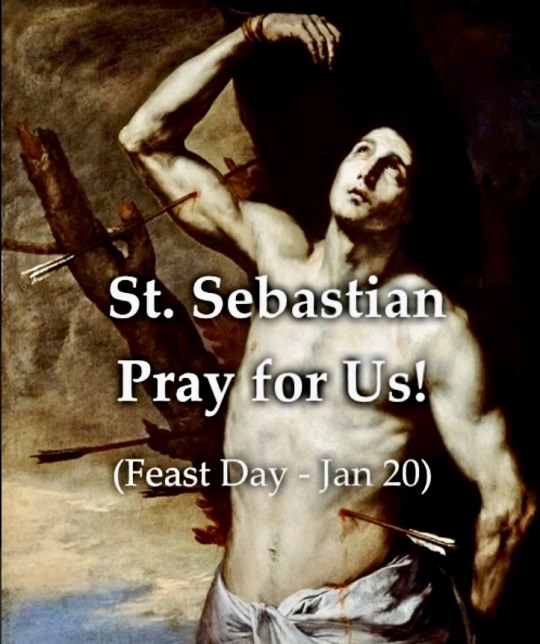

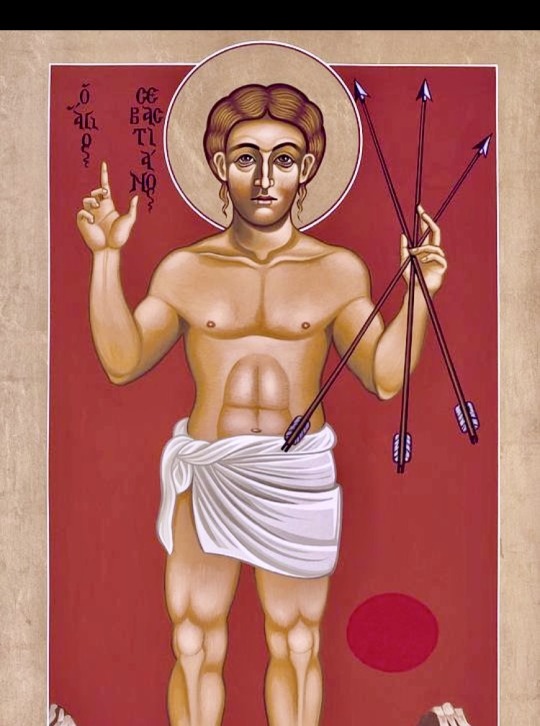



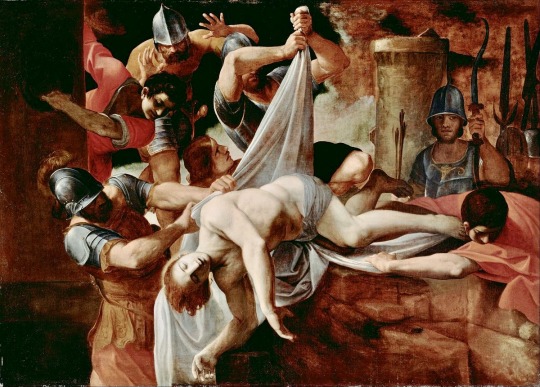
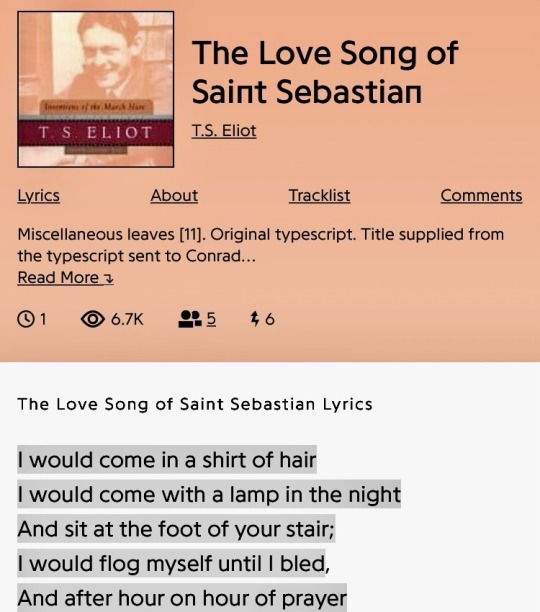
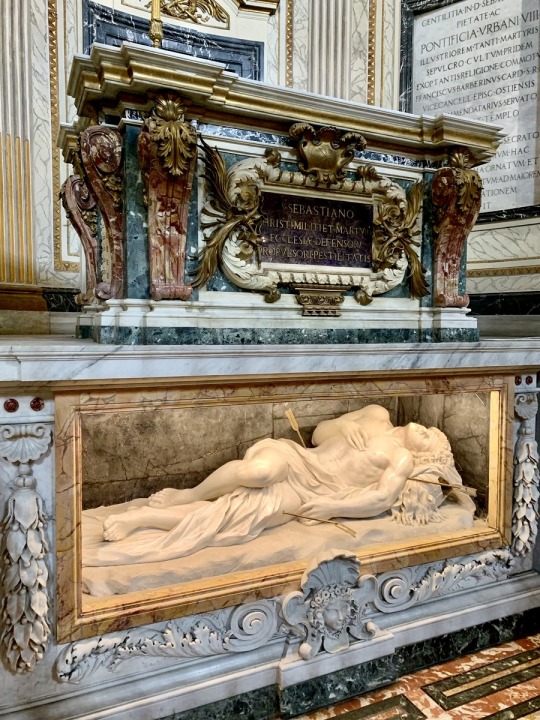

St Sebastian Martyr, Roman Soldier. He was born in Milan and was Martyred in c 288. St Sebastian was Martyred during the Roman Emperor Diocletian’s persecution of Christians. He is commonly depicted in art and literature tied to a post or tree and shot through with arrows. Despite this being the most common artistic depiction of Sebastian, he was rescued and healed by St Irene of Rome. Shortly afterwards he went to Diocletian to warn him about his sins and as a result, was clubbed to death. The details of Saint Sebastian’s Martyrdom were first spoken of by the 4th Century Bishop, the beloved and revered Doctor of the Church St Ambrose in his sermon (number 22) on Psalm 118. St Ambrose stated that Sebastian came from Milan and that he was already venerated there at that time. Please be aware there is Eroticism versus Mysticism in T.S. Eliot's "The Love Song of St. Sebastian" and "Death of St. Narcissus".
3 notes
·
View notes
Text
St. Ambrose, Bishop of Milan and Doctor of the Church - Information on the Saint of the Day - Vatican News
0 notes
Text

Saint Augustine of Hippo
Doctor of the Church
354 - 430
Feast Day: August 28
Patronage: brewers, printers, theologians
St. Augustine, Bishop of Hippo and Doctor of the Church, was the son of Saint Monica. He was raised a Christian, but lost his faith in youth and led a wild life. He lived with a woman from the age of 15 through 30 and fathered a son. After investigating and experimenting with several philosophies, he became a Manichaean but was converted by the prayers of his mother and the help of Saint Ambrose of Milan, who baptized him. He then spent the remainder of his life doing great things. His later thinking can be summed up in a line from his writings: "Our hearts were made for You, O Lord, and they are restless until they rest in You."
Prints, plaques & holy cards available for purchase here: (website)
89 notes
·
View notes
Photo


One Minute Reflection – 7 December – “The Month of the Divine Infancy and the Immaculate Conception of the Blessed Virgin Mary” – The Vigil of the Immaculate Conception – St Ambrose (340-397) – Confessor, Bishop, Father and Doctor of the Church – 2 Timothy 4:1-8, Matthew 5:13-19 – Scripture search here: https://www.drbo.org/ “Therefore, whoever breaks one of the least of these commandments and teaches others to do so, will be called least in the Kingdom of Heaven. But whoever obeys and teaches these commandments, will be called greatest in the Kingdom of Heaven.” – Matthew 5:19
REFLECTION – “For what reason then does He call some of these commandments “least,” although they are so magnificent and lofty? Jesus spoke this way because, He was about to introduce His own teaching, as a new law . As He humbles Himself and speaks of Himself with great modesty, so He refers to His own teaching in the same manner. In this way, Jesus teaches us to practice humility in everything. And besides, since some suspected His teaching to be a new departure, He temporarily taught it in a more reserved way. But when you hear “least in the Kingdom of Heaven,” you are to think of nothing but hell and punishment. For it was His practice to speak, not only of the joy the Kingdom brings but also, of the time of the resurrection and the fearful event of the Second Coming. Think of one who calls a brother a fool. That one, transgresses only one commandment, maybe even the slightest one and falls into hell. Compare that one with another, who breaks all the commandments and instigates others to break them too. Do both have the same relationship to the Kingdom? This is not the argument Jesus is making. Rather, He means, that one who transgresses only one of the commands will, on the final day, be the least — that is, cast out — and last and will fall into hell!” – St John Chrysostom (347-407) Archbishop of Constantinople, Father and Doctor of the Church (The Gospel of Saint Matthew, Homily 16).
(via One Minute Reflection – 7 December –The least in the Kingdom of Heaven – Matthew 5:19 – AnaStpaul)
24 notes
·
View notes
Text
My Saturday of the 1st Week of Advent Daily Blessings
December 7, 2024
Memorial of Saint Ambrose, Bishop and Doctor of the Church (Catholic Observance) Lectionary: 180
Readings for the Memorial of Saint Ambrose, bishop and doctor of the Church
First Reading: Is 30:19-21, 23-26
Responsorial Psalm: Ps 147:1-2, 3-4, 5-6
Verse Before the Gospel: Is 33:22
**Gospel: Mt 9:35–10:1, 5a, 6-8
**Meditation
Sources: Lectionary for Mass for Use in the Dioceses of the United States, second typical edition, Copyright © 2001, 1998, 1997, 1986, 1970 Confraternity of Christian Doctrine; Psalm refrain © 1968, 1981, 1997, International Committee on English in the Liturgy, Inc. All rights reserved. Neither this work nor any part of it may be reproduced, distributed, performed or displayed in any medium, including electronic or digital, without permission in writing from the copyright owner.
** Meditations may be freely reprinted for non-commercial use - please cite: copyright © 2023 Servants of the Word, source: dailyscripture.net, author Don Schwager.
Scripture quotations from Common Bible: Revised Standard Version of the Bible, copyright 1973, and Ignatius Edition of the Revised Standard Version of the Bible, copyright 2006, by the Division of Christian Education of the National Council of the Churches of Christ in the United States of America. Used by permission. All rights reserved. Bible: Revised Standard Version of the Bible, copyright 1973, and Ignatius Edition of the Revised Standard Version of the Bible, copyright 2006, by the Division of Christian Education of the National Council of the Churches of Christ in the United States of America. Used by permission. All rights reserved.
#catholic faith#catholic liturgy#morningreflections#prayer#christian faith#faith in god#faith in jesus#faith#virgin mary#divine mercy#fatima#padre pio#roman catholic
0 notes
Text
SAINT OF THE DAY (December 7)

Today, the Catholic Church celebrates the memory of St. Ambrose, the brilliant Bishop of Milan who influenced St. Augustine's conversion and was named a Doctor of the Church.
Like Augustine himself, the older Ambrose, born around 340, was a highly educated man who sought to harmonize Greek and Roman intellectual culture with the Catholic faith.
Trained in literature, law, and rhetoric, he eventually became the governor of Liguria and Emilia, with headquarters at Milan.
He manifested his intellectual gifts in defense of Christian doctrine even before his baptism.
While Ambrose was serving as governor, a bishop named Auxentius was leading the diocese.
Although he was an excellent public speaker with a forceful personality, Auxentius also followed the heresy of Arius, which denied the divinity of Christ.
Although the Council of Nicaea had reasserted the traditional teaching on Jesus' deity, many educated members of the Church – including, at one time, a majority of the world's bishops – looked to Arianism as a more sophisticated and cosmopolitan version of Christianity.
Bishop Auxentius became notorious for forcing clergy throughout the region to accept Arian creeds.
At the time of Auxentius' death, Ambrose had not yet even been baptized.
But his deep understanding and love of the traditional faith were already clear to the faithful of Milan.
They considered him the most logical choice to succeed Auxentius, even though he was still just a catechumen.
With the help of Emperor Valentinan II, who ruled the Western Roman Empire at the time, a mob of Milanese Catholics virtually forced Ambrose to become their bishop against his own will.
Eight days after his baptism, Ambrose received episcopal consecration on 7 December 374.
The date would eventually become his liturgical feast.
Bishop Ambrose did not disappoint those who had clamored for his appointment and consecration.
He began his ministry by giving everything he owned to the poor and to the Church.
He looked to the writings of Greek theologians like St. Basil for help in explaining the Church's traditional teachings to the people during times of doctrinal confusion.
Like the fathers of the Eastern Church, Ambrose drew from the intellectual reserves of pre-Christian philosophy and literature to make the faith more comprehensible to his hearers.
This harmony of faith with other sources of knowledge served to attract, among others, the young professor Aurelius Augustinus – a man Ambrose taught and baptized, whom history knows as St. Augustine of Hippo.
Ambrose himself lived simply, wrote prolifically, and celebrated Mass each day.
He found time to counsel an amazing range of public officials, pagan inquirers, confused Catholics, and penitent sinners.
His popularity, in fact, served to keep at bay those who would have preferred to force him from the diocese, including the Western Empress Justina and a group of her advisers, who sought to rid the West of adherence to the Nicene Creed, pushing instead for strict Arianism.
Ambrose heroically refused her attempts to impose heretical bishops in Italy, along with her efforts to seize churches in the name of Arianism.
Ambrose also displayed remarkable courage when he publicly denied communion to the Emperor Theodosius, who had ordered the massacre of 7,000 citizens in Thessalonica leading to his excommunication by Ambrose.
The chastened emperor took Ambrose's rebuke to heart, publicly repenting of the massacre, and doing penance for the murders.
“Nor was there afterwards a day on which he did not grieve for his mistake,” Ambrose himself noted when he spoke at the emperor's funeral.
The rebuke spurred a profound change in Emperor Theodosius.
He reconciled himself with the Church and the bishop, who attended to the emperor on his deathbed.
St. Ambrose died in 397.
His 23 years of diligent service had turned a deeply troubled diocese into an exemplary outpost for the faith.
His writings remained an important point of reference for the Church, well into the medieval era and beyond.
St. Ambrose has been named one of the “holy fathers of the Church, whose teaching all bishops should in every way follow.”
2 notes
·
View notes